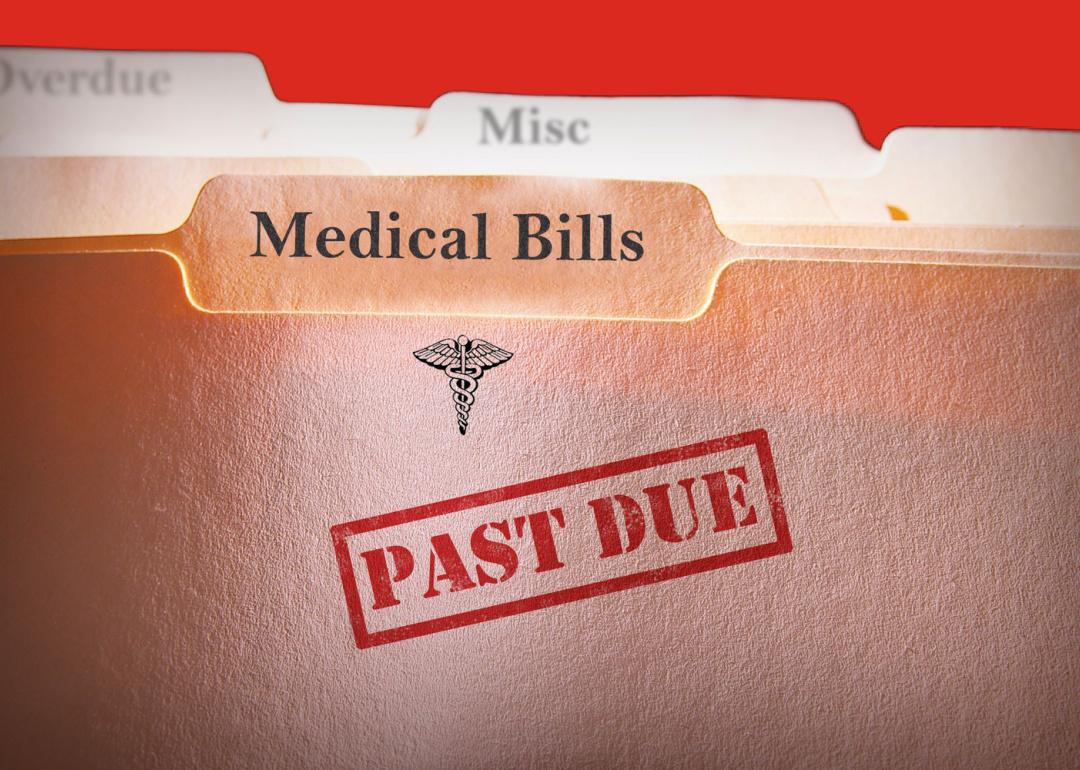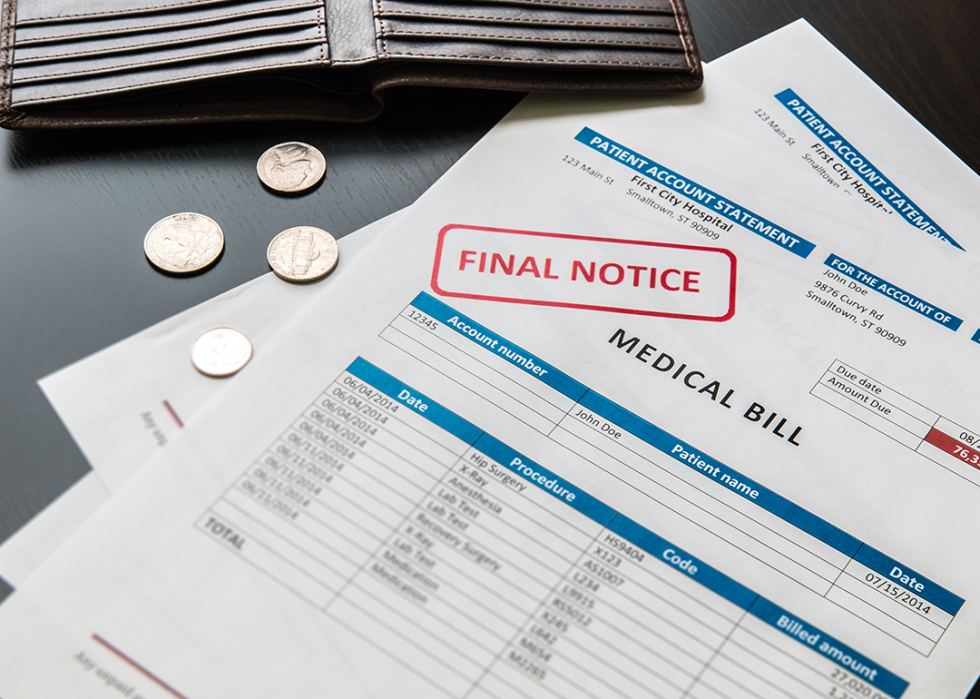
5 most frequent complaints about medical billing errors
This story originally appeared on Soundry Health and was produced and distributed in partnership with Stacker Studio.
5 most frequent complaints about medical billing errors
Errors in medical billing can be a headache for patients—not to mention potentially expensive and time-consuming to sort out. Decoding health insurance documents can be complicated enough, but add in health care providers who often have their own billing systems and it's no wonder that consumers struggle to understand their bills. Patients have reported finding it difficult to figure out what they were charged for, how much they were charged, and whether those charges are fair and reasonable—or incorrect and too high.
But medical billing errors don't only cause problems for patients. They also are a source of frustration for providers, who lose time and money untangling billing codes, insurance requirements, partial payments, and other bureaucratic aspects of billing and payment procedures.
To demystify the issue, Soundry Health analyzed data from the Consumer Financial Protection Bureau to see what kinds of complaints the agency received regarding their medical bills. The time period of the complaints received spanned from Dec. 1, 2011 through Oct. 27, 2023.
In 2020, nearly 4 million people older than 65 had unpaid medical bills, despite 98% of them having health insurance, according to data from the CFPB. What's more, 70% of those seniors with unpaid medical bills were covered by two or more medical insurance plans.
Medical billing errors have long-lasting ramifications for patients. In 2021, American consumers had a staggering $88 billion in medical debt on their credit records, though the real amount is likely even higher because not all of those debts are documented by consumer reporting agencies, according to the CFPB.
When people get fed up with error-filled medical bills, they complain to the CFPB, in hopes of getting help understanding what they need to pay—and relief from costly erroneous charges. Here are the five most commonly reported complaints about medical bills, ranked in order of how many complaints were received by the CFPB.

Attempts to collect debt not owed
Identified in 34.7% of consumer complaints December 2011-October 2023
--Debt is not yours: 18.3% of complaints
--Debt was paid: 10.5% of complaints
--Debt was result of identity theft: 5.1% of complaints
Phantom debt is debt that was never yours, but bill collectors may try to get you to pay it anyway. Some may use persistent or even aggressive and threatening methods to intimidate consumers. In 2021, the government permanently banned a group of phantom debt collectors from the collection industry who used unscrupulous practices to demand payment for fraudulent bills. The group often used robocalls to leave scam messages threatening arrest or lawsuits for people who did not pay fake debts. Victims would often send money out of fear.

Written notification about debt
Identified in 20.5% of consumer complaints December 2011-October 2023
--Didn't receive enough information to verify debt: 13.5% of complaints
--Didn't receive notice of right to dispute: 6.3% of complaints
--Notification didn't disclose it was an attempt to collect a debt: 0.7% of complaints
Debt collection can be confusing for consumers because every state has its own laws regarding the practice, and the industry is rife with errors and scammers. Consumers have rights under federal and state laws, though, including the right to be notified if a communication is an attempt to collect a debt and notice of how to dispute the debt claim.
If you suspect that you have a medical billing error, contact your health care provider for an itemized bill and look for mistakes. In addition, compare your medical bill to your insurance company's explanation of benefits and call your health insurer to make sure the correct amount was paid for your service. You may have to file an appeal with your insurance provider if you think they underpaid for a service that should have been covered.

Continued attempts to collect debt not owed
Identified in 13.4% of consumer complaints December 2011-October 2023
--Debt is not mine: 6.6% of complaints
--Debt was paid: 5.8% of complaints
--Debt resulted from identity theft: 0.7% of complaints
The law requires bill collectors to send a debt validation notice. The notice must include the name of the creditor who wants payment and the amount they claim is owed, among other critical information. After receiving the notice, consumers have 30 days to dispute the bill in writing. Once the bill is disputed in writing, the bill collector must stop contacting you until they've shown they have responded to your dispute, often with verification of the unpaid debt.

False statements or representation
Identified in 8.5% of consumer complaints December 2011-October 2023
--Attempted to collect wrong amount: 7.6% of complaints
--Impersonated attorney, law enforcement, or government official: 0.4% of complaints
--Indicated you were committing crime by not paying debt: 0.2% of complaints
Legally, bill collectors are not allowed to collect money under false pretenses. This includes asking for the wrong amount, sending bills in envelopes that appear to be from a government agency, or claiming that you are committing a crime if you do not pay the debt. If a bill collector says they are—or attempts to act like—an attorney, law enforcement officer, or any other government official, you can file a fraud report with the Federal Trade Commission or contact the CFPB online or via telephone at 855-411-2372.

Communication tactics
Identified in 7.4% of consumer complaints December 2011-October 2023
--Frequent or repeated calls: 3.4% of complaints
--You told them to stop contacting you, but they keep trying: 1.5% of complaints
--Used obscene, profane, or other abusive language: 0.7% of complaints
About 17% of Americans—roughly 1 in 6 people—have medical debt in collections, according to a consumer credit report analysis from the Journal of the American Medical Association. However, owing money does not justify harassment or abuse.
Debt collection agencies cannot report unpaid medical bills to credit bureaus until one year has passed. That gives consumers time to dispute any errors on the bill without punitive damage. The CFPB is proposing removing unpaid medical bills from credit reports entirely. In addition, no paid medical debt should be reported on your credit report, and the credit bureaus will not include reports of medical debts that are less than $500.
The federal Fair Debt Collection Practices Act says that collectors cannot abuse, coerce, threaten, or be deceptive when collecting. If you are receiving abuse from collectors, you can write a letter to cease communication, file a complaint with the CFPB or the Federal Trade Commission, or contact your state attorney general's office.
Data reporting by Wade Zhou. Story editing by Jeff Inglis. Copy editing by Tim Bruns.



